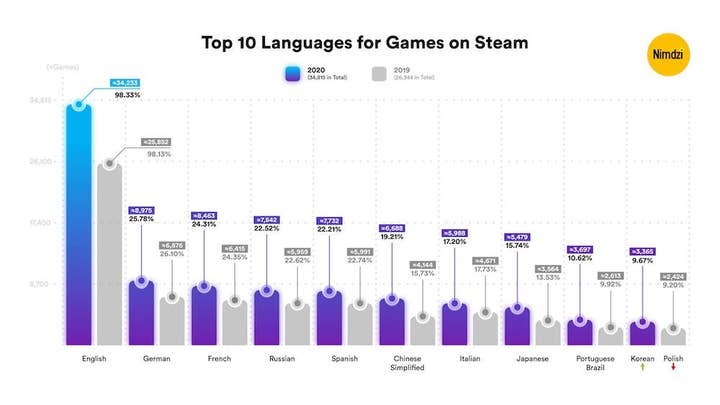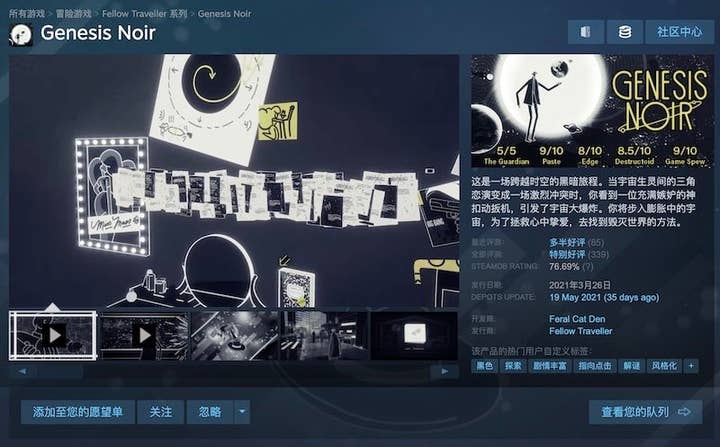Game localization for discovery: Trickier than you think?
GameDiscoverCo's Simon Carless says the decision to localize is about a lot more than the size of the target market
This piece originally appeared in GameDiscoverCo game discovery newsletter, written by 'how people find your game' expert and GameDiscoverCo founder Simon Carless, and is a regular look at how people discover and buy video games in the 2020s.
So, it turns out localization is a really important part of game discovery, since it opens up so many new potential markets for your PC/console games. How do localization and discovery interact? Well, for example, the Chinese market is massive on Steam. If your game isn't translated into Chinese, most of the millions of Steam players in China won't even see it as a default game in their Steam store.
(Another way to look at it: if you do a Chinese translation, it's like you're competing in a different Steam store with 6,000 games instead of 34,000. Sounds like a good idea, right?)

Anyhow, above is a handy graph compiled by Nimdzi Research last year, crunching the numbers across all Steam games in 2019 and 2020 to see which languages are moving up or down.
And it can be quite dynamic -- Nimdzi noted that, "the proportion of Russian (which outpaced Spanish) and Simplified Chinese (which outpaced Italian) [games] increased, and Korean pushed Polish out of the top 10."
So whether you're a tiny indie or a massive company, how should you think about localization with regard to discovery? Here's some key points:
● Try to get localization into your discovery story as early as possible: Don't just jam in localizations and tick the Steam page boxes at the last minute! Translate your Steam pages for launch, and even make translated versions of your Steam demos/Next Fest showcases for maximum reach. It can make a big difference.
● Move away from those historic 'EFIGS' trends: It used to be that you would translate your game into EFIGS -- English, French, Italian, German, and Spanish -- and then be done. But the added reach -- on PC in particular -- of adding other languages (particularly Chinese!) has become incredibly important in recent years. Don't start with EFIGS.
● Think carefully about cost/benefit for text-heavy games: If you're using professional translation for games with tens of thousands of words of text, your costs might get into six figures (USD!) if you do a lot of translations. So you do need to think: how many more copies am I selling with this extra language, and am I taking into account 'gross to net' when working out the upside?
● Consider using crowdsourced translations -- but beware pitfalls: You can read this 'how to' from Krumit's Tale on crowdsourced translations, in this case using Localizor. And if you're running with a low budget or want some very exotic languages supported, it's worth considering it.
But you get what you pay for. A smaller game may not get any translation interest at all. And when you do get helpers, sometimes the translations are Google Translate quality, sometimes they're OK. And it's difficult to work out which, until you show the public.

Continuing with some comments from actual practitioners: Chris Wright, head of wondrous narrative publishing label Fellow Traveller, said his company prioritizes localizing to languages "that open up markets of size that we might not otherwise have done well in or been able to launch in".
Of course, he does also have French and German language versions of his games (like Genesis Noir, shown above in Simplified Chinese). But the top 'bang for the buck' for languages, in his view, are as follows:
- Simplified Chinese
- Japanese, if it's also on Switch (opens up the Japanese market)
- Traditional Chinese, if it's also on Switch (opens up the Taiwan/Hong Kong store)
- Russian
- Brazilian Portuguese
Chris particularly noted that Chinese localization (and local PR help) took some of his catalog from 5% or less of units in China sold to 20% or more. (Though there's a cheaper USD-equivalent price and more Steam refunding in China.)
Also weighing in on this when it was discussed in the GameDiscoverCo Plus Discord (we got permission to reprint their comments, btw) was Tim Bender of strategy publisher Hooded Horse.
He has been analyzing Steam wishlist rates, comparing a) rates prior to the announcement of localization, and b) rates after the announcement of localization and a localized Steam page was uploaded.
He notes, across a couple of games in his catalogue: "For languages like French and German, my estimates are that 60-65% of post announcement wishlists in that country would have occurred anyway. So 35-40% of the post announcement wishlists were because of the localization. Therefore, localization caused around a 50% country-specific increase in wishlists.
"Elsewhere, looking at Spanish, slightly over half of wishlists were because of the localization. So that's a little over 100% increase in wishlists. And for East Asian languages, over 90% were because of the localization."
Since we originally published this newsletter, we also spotted this comment from Embracer Group advisor and former Raw Fury employee Martin Lindell: "I can attest that Brazilian Portuguese was an important addition for Kingdom. Also worth point[ing] out that Turkish is great for PC games, and for the right game Arabic, if you're doing PlayStation (a bit like Japanese & Switch)."
We separately heard feedback on Arabic for PlayStation, since there seems to be a loyal and growing market of fans in this region, and some of them have deep pockets -- particularly useful if you have DLC or IAP for your game.
Concluding, this is all further indication that things aren't as simple as, 'Where does a platform have the most users? Localize there!'
It's also about maximizing discovery in those areas of the world where there are fewer English speakers -- your post-localization sales increase may be larger. Which is why localization choices are trickier than you think.
GameDiscoverCo is an agency based around one simple issue: how do players find, buy and enjoy your premium PC or console game? You can subscribe to GameDiscoverCo Plus to get access to exclusive newsletters, interactive daily rankings of every unreleased Steam game, and more.
